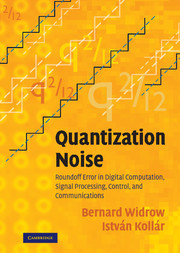 Quantization Noise
Quantization Noise Book contents
- Frontmatter
- Contents
- Preface
- Acknowledgments
- Glossary of Symbols
- Acronyms and Abbreviations
- Part I Background
- Part II Uniform Quantization
- Part III Floating–Point Quantization
- Part IV Quantization in Signal Processing, Feedback Control, and Computations
- Part V Applications of Quantization Noise Theory
- Part VI Quantization of System Parameters
- APPENDICES
- A Perfectly Bandlimited Characteristic Functions
- B General Expressions of the Moments of the Quantizer Output, and of the Errors of Sheppard's Corrections
- C Derivatives of the Sinc Function
- D Proofs of Quantizing Theorems III and IV
- E Limits of Applicability of the Theory — Caveat Reader
- F Some Properties of the Gaussian PDF and CF
- G Quantization of a Sinusoidal Input
- H Application of the Methods of Appendix G to Distributions other than Sinusoidal
- I A Few Properties of Selected Distributions
- J Digital Dither
- K Roundoff Noise in Scientific Computations
- L Simulating Arbitrary–Precision Fixed–Point and Floating–Point Roundoff in Matlab
- M The First Paper on Sampling–Related Quantization Theory
- Bibliography
- Index
K - Roundoff Noise in Scientific Computations
from APPENDICES
Published online by Cambridge University Press: 06 July 2010
- Frontmatter
- Contents
- Preface
- Acknowledgments
- Glossary of Symbols
- Acronyms and Abbreviations
- Part I Background
- Part II Uniform Quantization
- Part III Floating–Point Quantization
- Part IV Quantization in Signal Processing, Feedback Control, and Computations
- Part V Applications of Quantization Noise Theory
- Part VI Quantization of System Parameters
- APPENDICES
- A Perfectly Bandlimited Characteristic Functions
- B General Expressions of the Moments of the Quantizer Output, and of the Errors of Sheppard's Corrections
- C Derivatives of the Sinc Function
- D Proofs of Quantizing Theorems III and IV
- E Limits of Applicability of the Theory — Caveat Reader
- F Some Properties of the Gaussian PDF and CF
- G Quantization of a Sinusoidal Input
- H Application of the Methods of Appendix G to Distributions other than Sinusoidal
- I A Few Properties of Selected Distributions
- J Digital Dither
- K Roundoff Noise in Scientific Computations
- L Simulating Arbitrary–Precision Fixed–Point and Floating–Point Roundoff in Matlab
- M The First Paper on Sampling–Related Quantization Theory
- Bibliography
- Index
Summary
Roundoff errors in calculations are often neglected by scientists. The success of the IEEE double precision standard makes most of us think that the precision of a simple personal computer is virtually infinite. Common sense cannot really grasp the meaning of 16 precise decimal digits.
However, roundoff errors can easily destroy the result of a calculation, even if it looks reasonable. Therefore, it is worth investigating them even for IEEE double precision representation.
COMPARISON TO REFERENCE VALUES
Investigation of roundoff errors is most straightforwardly based on comparison of the results to reference values, that is, to the outcome of an ideally precise calculation.
First of all, we need to note that the way of comparison is not well defined. It is usually done by looking at the difference of the finite precision result and of the reference value. This is very reasonable, but cannot be applied in all cases. If, for example, we investigate a stand–alone resonant system, the reference and the finite precision results could be two similar sine waves, with slightly different frequency. In such a case, the difference of the imprecise result and precise result grows significantly with time, although the outputs are still very similar. Therefore, the basis of comparison needs to be chosen very carefully.
Information
- Type
- Chapter
- Information
- Quantization NoiseRoundoff Error in Digital Computation, Signal Processing, Control, and Communications, pp. 697 - 710Publisher: Cambridge University PressPrint publication year: 2008